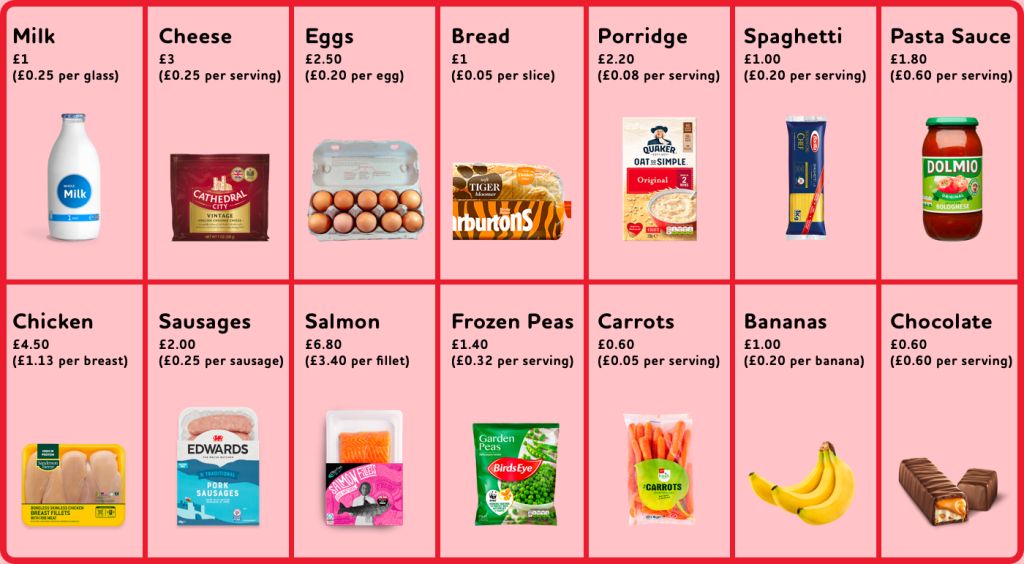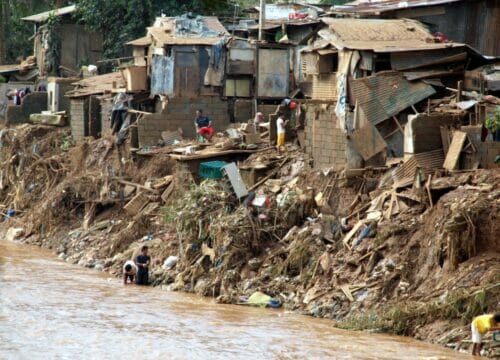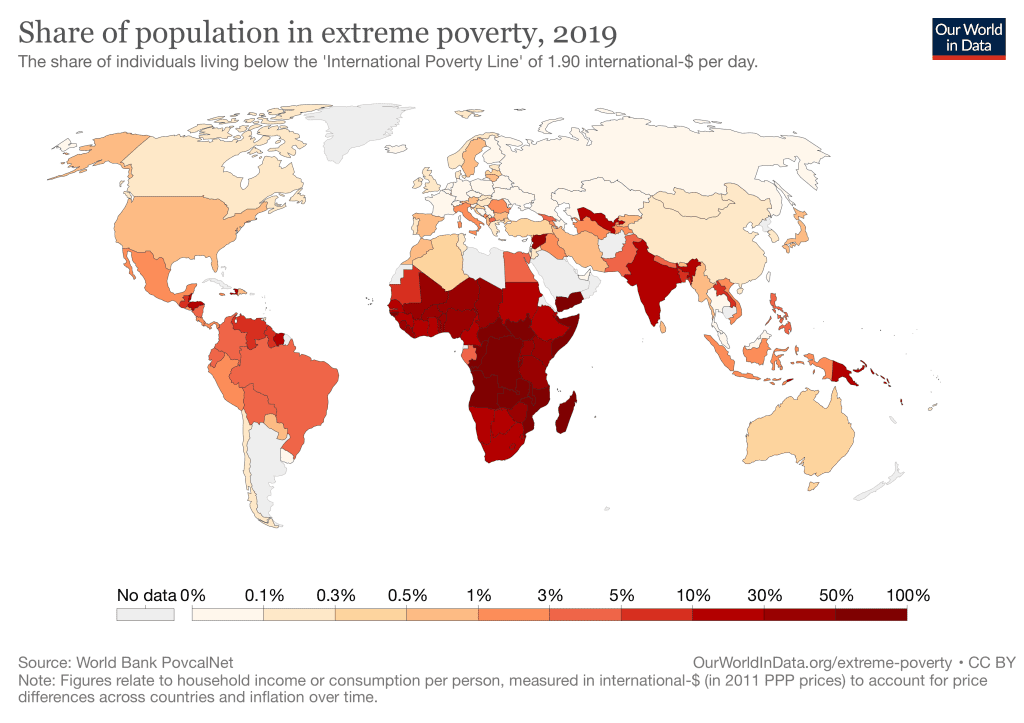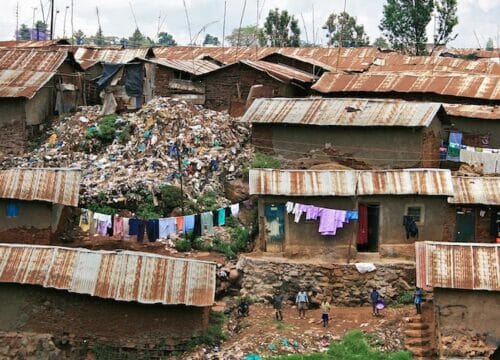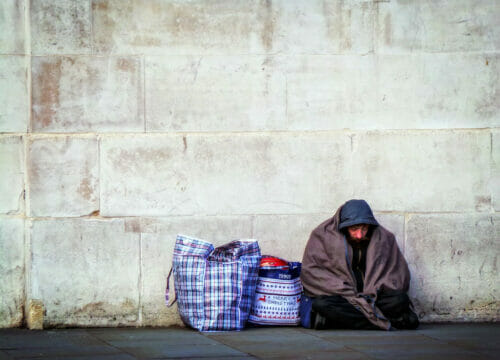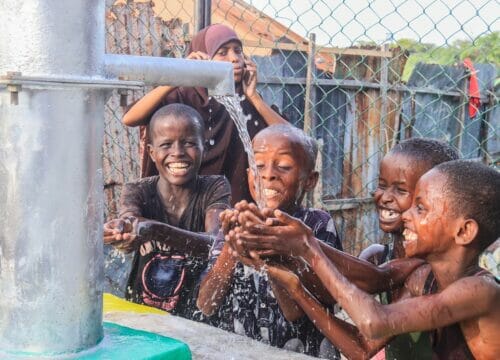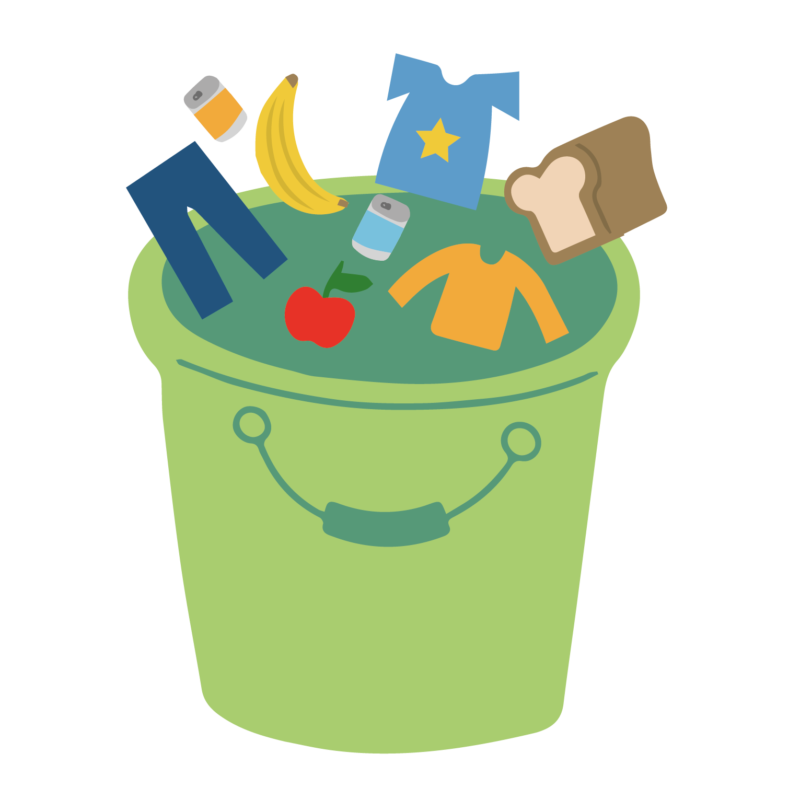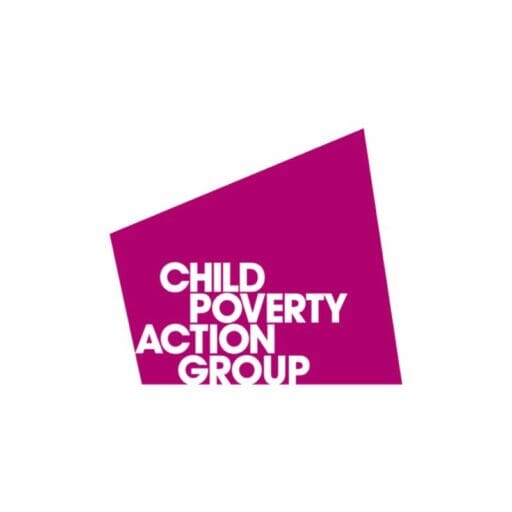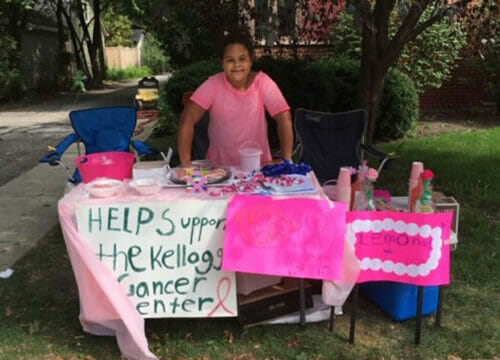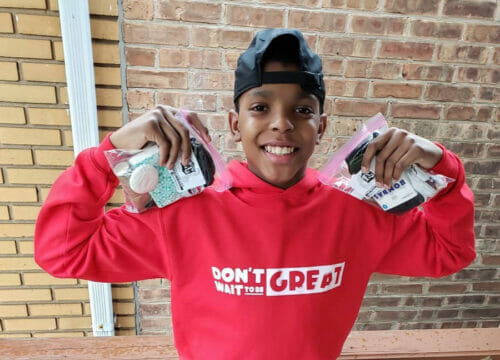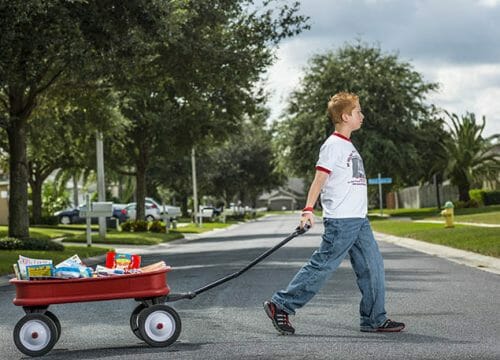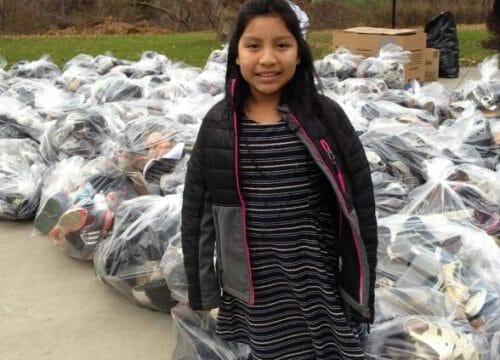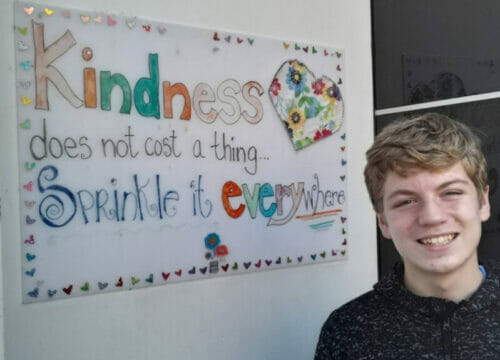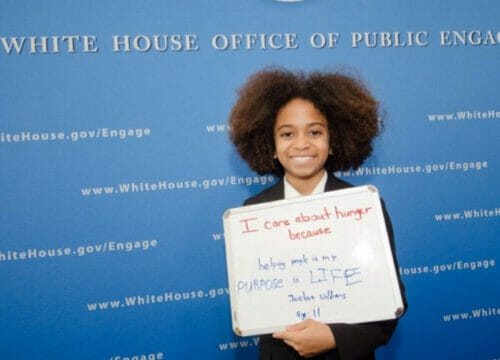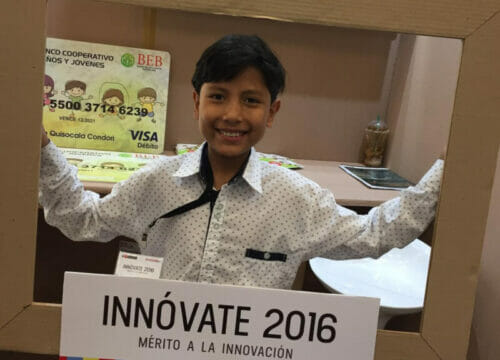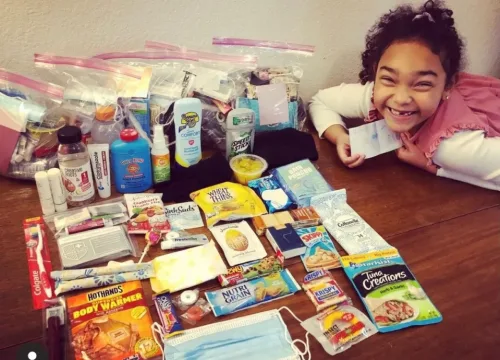Comic Relief is a charity that helps people in need by raising money for families and children in the UK and worldwide.
No Poverty
Enough money for everyone

1. THE PROBLEM
How much money do you think your food costs every day?
The average person living in the UK, spends about £6 on food a day. And on top of that, they need to keep a roof over their head, stay warm and buy clothes.
Unfortunately, 712,000,000 people in the world are living on less than £1.40 a day.

2. The Solution
So what can we do to help?
Beating poverty is a significant challenge but big leaps are being made and over the last 30 years more than 1.2 billion people have escaped this situation.
Charities and organisations can offer immediate help to those living in poverty.
In the long-term, to prevent poverty, we need to address its causes.

3. Take Action
There are lots of ways that anyone, including you, can make a difference in beating poverty. For example, you could: organise a donation drive, collecting items for people in need or make a poster to raise awareness about diversity and inclusion.
Everyone can take action to make real change. What will you do?



4. CHARITIES
There are lots of charities that need your help to reduce poverty around the world.
For example, Shelter work to reduce homelessness, Child Poverty Action Group tackles poverty among children and The Children’s Book Project collect book donations and distribute them to children living in poverty.
See how you can support them in their amazing work.
How did it go? Are you surprised? It’s amazing how quickly tiny amounts can add up to a really big amount.
Depending on what you eat, and how much of it you eat, your total might have come to about £6 (the average person in the UK spends about £6 a day on food).
On top of paying for food, you need to keep a roof over your head, stay warm and buy clothes. So, your basic needs cost quite a few pounds every single day.
Many people around the world just don’t have enough money to do all of these things.
If you’re wondering why these people don’t just get a better job, sadly, things aren’t so simple. You’ll see more about that in a moment.
Before going further, pause and think about what it means to be extremely poor – in other words, to be living in poverty. Poverty is when you don’t have enough money to meet basic needs. These needs include having food, water, shelter, clothing and healthcare.
So, how do you know when someone is living in poverty? There are many ways to measure this but the most common way was designed by the World Bank. The World Bank measures extreme poverty as living on $1.90 (about £1.40) or less a day.
What can you do with £1.40? In the UK:
- a basic bottle of handwash costs £1.40
- a journey on a London bus costs £1.55
- a pack of 12 colouring pencils costs £1.20
People living in extreme poverty have to make some impossible decisions. Buying a pair of shoes for winter, for example, might mean not being able to buy food for a week.
*The food prices in the picture were noted in 2022 and food prices are rising every day.
The problem
712,000,000
PEOPLE IN THE WORLD ARE living in extreme poverty
356,000,000
of those people are children
150,000,000
people in the world are homeless
1. Causes of poverty
PEOPLE DON’T HAVE JOBS OR A WAY TO EARN MONEY
The most obvious cause of poverty is not having a stable income. Some people might not be able to find a job, while others have a job that doesn’t pay enough to cover their cost of living. There are many reasons why people might struggle to find a job at all or a job that pays what they need to afford their basic needs. For example:
Social injustice means that people may not have opportunities because of things like gender, race or economic background. In some countries, women aren’t allowed to carry out certain jobs and they get paid less than men. This happens in Russia where there is a list of jobs women are not allowed to do – like drive trains. People from poorer backgrounds might find it almost impossible to get a certain job because the job has specific requirements that are much easier for people from more privileged upbringings to meet.
Education teaches people the skills they need to be able to do certain jobs. Many people don’t get a quality education. Without quality education, people can’t read, write, learn to reason well and do stacks of other things you don’t even realise you’re learning at school. This makes it more difficult to get a job.
Suffering from poor health may mean that people are too poorly to work. For example, in some parts of the world, malaria keeps people in poverty. Poor people are more likely to get malaria because they may not be able to afford bed nets to keep the mosquitoes away. When they contract malaria, they may not be able to get the medicine that they need to make a full and fast recovery, preventing them from going to school and doing their jobs. Many of the poorest countries in the world are some of the countries with the highest rates of malaria.
Living in an area of war or conflict can make it very difficult to earn an income. People living in these areas may have to move somewhere else in search of a safer life, forcing them to leave everything behind – their homes, their schools, and their jobs. In countries that are experiencing war, many non-essential services (such as cinemas, restaurants or gyms) close down, since it is not safe for people to travel to them, so people who used to work at those places lose their job. Watch the video below telling the story of 13-year-old Abdallah, living in the Za’atari refugee camp.
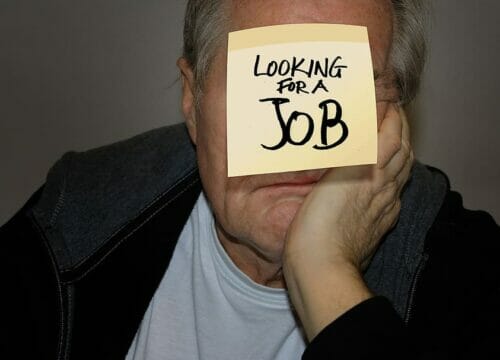
Abdallah's Story - Living in Za'Atari Refugee Camp
Before fleeing Syria, Abdallah’s father used to work as a farmer. He earnt enough money for their family to live well– they lived in a nice home, went to a good school and always had enough food. But, when they fled Syria, they had to leave the farm behind. Now, Abdallah and his father wake up at 7 am and walk the streets collecting old, dry bread from peoples’ homes. They then bag the bread and sell it to a man who uses it to feed his animals. Their bread business brings in just enough money to put food on the table for their family.
Climate Change and Natural Disasters
Climate change causes extreme weather events. Some weather events such as storms and hurricanes destroy people’s homes and livelihoods. This comes at a great cost since they need to rebuild their homes entirely. Other events, such as droughts, may affect people’s income. For example, farmers’ crops may fail due to drought, meaning that they cannot sell their harvest and make money.
Where Does Poverty Happen?
Interpreting the Map
This map shows how many people in each country are living in extreme poverty. The key at the bottom can help you interpret the map. In the countries in dark red, nearly 100% of the population is living in extreme poverty. In the countries in cream, less than 0.1% of the population is living in extreme poverty.
When you look at this map, you might think that there are some countries with no extreme poverty but poverty is everywhere.
Yes, some countries are much better off than others. But bear in mind that the ‘International Poverty Line’ is not a perfect measure of poverty. Remember the shopping exercise from earlier on, where you tried to see what a day’s food costs? You may have discovered that it’s impossible to survive in the UK with only £1.40 a day. This is because, in richer countries, things cost more.
Many people in the UK live above the ‘International Poverty Line’ but still cannot afford enough food for an entire day. In the UK, basic needs such as food, clothing, heating and rent are so expensive that any family earning less than £17,760 per year (£49 a day) is considered to be living in relative poverty. This means that in 2021, more than 4.3 million people in the UK were living in a family that was struggling to afford their basic needs.
2. Effects of Poverty
Poverty can have many different effects. Poverty in a relatively rich country looks different to poverty in a poor country. Have you ever seen any of these effects of poverty where you live?
Fact: 1.6 billion people in the world live without adequate shelter. 150 million of these people are completely homeless.
People living in extreme poverty often do not have a roof over their heads. When this happens, they are considered homeless. Homelessness can be dangerous, especially at night or in winter when it gets extremely cold. Some homeless people may access a homeless shelter and others may have to sleep on the streets. In many countries, homeless people build shacks from scrap metal and wood. This is a type of homelessness since these people are often squatting illegally and shacks don’t give proper shelter. Water leaks in when it rains and there is often no running water or electricity. This makes it hard for people to take care of themselves and their belongings.
Fact: 821 million people in the world do not have enough food.
People living in extreme poverty cannot buy the food they need to lead an active and healthy lifestyle. Without nutritious food, some people lose muscle and fat and get sick more often. Others don’t lose fat but become overweight because they are relying on cheap, starchy foods that give them energy but aren’t healthy. Some hungry people may have access to food banks or emergency food parcels, while others have no choice but to go hungry.
Fact: 785 million people in the world do not have access to clean water.
People living in extreme poverty often do not have access to clean water to drink, wash and cook. Using dirty water for these activities causes diseases like diarrhoea, making people sick.
Fact: In 2021, men living in the richest parts of London were expected to live to 84 years old, while men living in poorer areas such as Blackpool were expected to live to 74 years old.
People living in extreme poverty are often not able to get to a good doctor or hospital and even if they can, they are more likely to get sick because they don’t have proper food, clothing, shelter and heating. For example, in the UK, where there is a universal healthcare system, people in rich areas still live much longer than those living in poor areas.
People living in extreme poverty get stuck in what is called a ‘cycle of poverty’. Poverty causes them to miss out on quality education so they get stuck in low-paying jobs and can’t escape poverty.
Cycle of Poverty
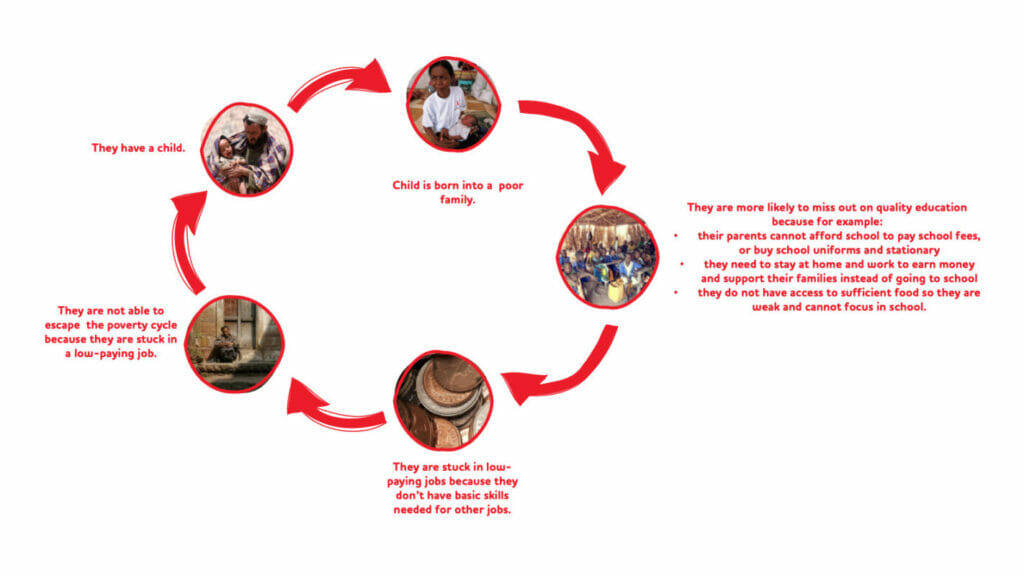
Take a Guess
The Solution
In the last 30 years, more and more people have escaped extreme poverty, offering great hope for the future. But this still leaves hundreds of millions of people across the world who cannot afford their basic needs. So, there’s a lot to do.
Click here to view a live poverty count. Take a look at the number of people who escaped poverty today, compared to the number of people who fell into poverty today. Hopefully, the number of people who escaped poverty will be higher than the number of people who fell into poverty, showing that efforts to get rid of poverty are working.
1. Immediate Help
In the short term, there are lots of charities and organisations that help those living in extreme poverty. With help from people like you, charities can supply products (such as food, water, clothes, books and toys) and services (such as health care, education, temporary shelter and employment advice) to those in need.
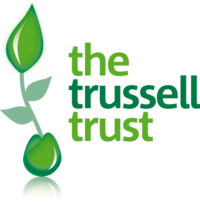

In many developed countries, such as the UK, governments allocate some of the money that they raise in tax to those most in need. For example, the government might give money to people who don’t have a job or provide subsidised housing for those who cannot afford to pay their rent. When a government provides support like this to people in need, it is known as a welfare state. Governments must decide how much of the country’s money to spend on the welfare state and how much to spend on other things such as hospitals, schools and roads. No government has unlimited money, so they have some difficult choices to make. Even in rich countries, not all citizens have access to all the products and services that they need to lead a happy and healthy life. In most countries, it is up to the people in the country to vote and choose which political party will be their government. Some people think about how much a political party will spend on the welfare state when they choose who to vote for.
2. Lasting Solutions
There is a famous saying that goes: ‘Give a man a fish, and you feed him for a day. Teach a man to fish, and you feed him for a lifetime’. If you truly want to help someone in poverty, the best thing is to help them get out of poverty – that way they can help themselves.
If we want to lift the remaining 712 million people out of poverty and help them escape the cycle of poverty, we need to address the causes of poverty that we talked about above.
It is most important for us to:
- Get countries and communities to work together. This will help maintain peace so that countries can share knowledge about how to achieve the things that everyone wants – like keeping everyone healthy.
- Raise awareness about how people are different and that everyone should be included. Everyone should have a fair shot at opportunities such as education, healthcare and should receive fair treatment in society and work.
- Encourage governments to create countries that are equal and fair, where everyone has access to what they need. This could be done by using a certain type of tax system, where wealthy people pay more tax than poor people. They could also provide universal healthcare, which helps everyone living in a country to access healthcare, no matter how much money they have.
For more information on solutions to each of these problems, click on the icons below to view their specific pages.
Take action
Now that you understand a bit more about poverty, it’s time to make a difference. This isn’t a topic that is nice to think about, and it can sometimes make people feel bad for being so well taken care of. Instead of feeling guilty, you can be thankful for everything you have and get to work and help. Because you aren’t stuck in the poverty cycle, you’re in a position to make a real difference. There is so much that you can do, and this doesn’t necessarily involve giving a lot of money. If you want to do something practical to help, the power is in your hands. Take a look at some ways you can take action right now.
Fundraise
- You can make a massive difference to people and the planet by doing fundraising for charities that work to beat poverty. Some of the things the money you raise can achieve:
- £10 provides 40 meals for children in need.
- £25 provides someone with the specialist advice they need to get a job.
- £75 can buy books for 180 children and pencils for a whole school.

- Do an assembly at school to teach your schoolmates about poverty and what they can do to help. Pick out some facts and figures from this page to highlight the severity of the problem. Encourage your schoolmates to donate things that they no longer need. For example, they could donate books that they have finished reading to The Children’s Book Trust.
- Write to your MP to ask them to introduce measures to help those who cannot afford to buy enough food to stay healthy.
- Make a poster about diversity and inclusion. Show people that our differences are what make the world interesting and help us grow and learn from each other. You could make a poster on inspiring people, featuring people from all different genders, races, religions, economic backgrounds, etc.
- Talk to your family about different governments and which government they support. Ask questions to learn about why they support who they support and share your opinion too. Talk about what characteristics you value in a government.
- Organise a donation drive, collecting items for people in need. Share the word about your donation drive and how people can donate through conversations, speeches, and posters.
- Food: Donate to a charity such as The Trussell Trust.
- Books: Donate to a charity such as Children’s Book Project.
- Christmas presents: Donate Christmas presents to children whose families might not be able to buy them Christmas gifts.
- Volunteer your time at a homeless shelter. Find volunteering opportunities with Crisis here.

If you have any other ideas of SuperKind things people can do to help eradicate poverty, we would love to hear from you here.
Support These Amazing Charities
The National Literacy Trust
The National Literacy Trust is an independent charity that empowers children, young people, and adults with the literacy skills they need to succeed.
Children’s Book Project
The Children’s Book Project is a charity that aims to make sure every child has their very own books to read and enjoy. 📚✨
Shelter
Home is a human right. We exist to defend the right to a safe home and fight the devastating impact the housing emergency has on people and our society.
Freedom4Girls
Freedom4Girls are a UK-registered charity fighting against period poverty. Founded in 2016, we have been working tirelessly to end period poverty in the UK and Kenya. We help those without ...
Child Poverty Action Group
More than one in four children nationwide are growing up in poverty. It doesn’t have to be like this. CPAG works to prevent and end child poverty – for good.
Books2Africa
Books2Africa’s mission is to promote recycling and improve the quality of education in Africa, through the collection, processing, shipping and distribution of quality books, computers, and educational materials
Change-Makers
Here are some amazing young people who cared about eradicating Poverty and took action to make change happen. These change makers were all passionate about the same cause but used their unique skills to make change happen in different ways.
Everyone can help make a difference. Consider what your unique superpower might be. Are you someone with a strong voice who likes to spread awareness by talking to everyone you meet? Or do you prefer a behind the scenes approach – making sure that donations are collected to take to those in need?
Olivia Ohlson
Set up organisations supporting cancer patients, people in poverty, and promoting golf in young black girls, since she was 10 years old.
José Quisocala
Creating and growing a bank that helps children save money by recycling since he was 12 years old.
Jack Berne
Fundraising for the farmers whose incomes have been affected by drought in Australia since he was 11 years old.
Henry Cleary
Running a marathon in 10 days to raise money for homeless people when he was 7 years old.
